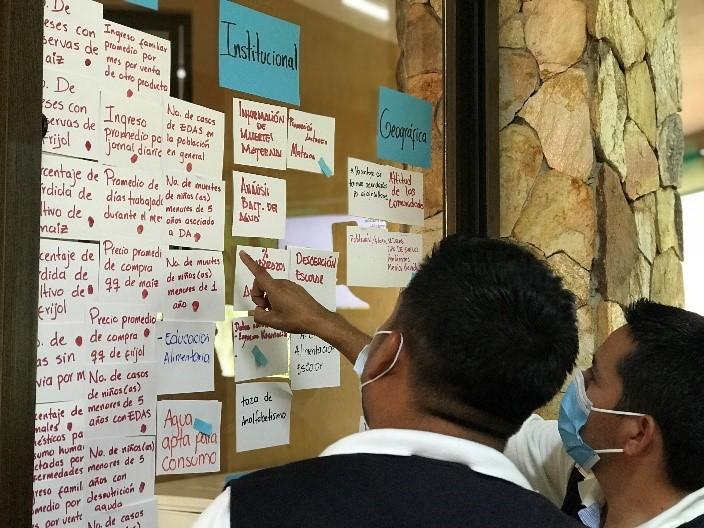Improving Data Usage for climate and food security decision-makers in Guatemala’s dry-corridor

Evidence-based decision making in climate risk management for food security and data literacy that matches users’ needs is receiving greater attention in recent months. Those who use the data, for either communication or decision making, need good data-literacy skills to make sense of and understand the data well for decision-making. To support partners in Guatemala in improving their information usage for food security management in the ‘dry-corridor’, CCAFS scientists organized a series of workshops and training sessions around data literacy, data storytelling and the design of information products.
During August and September 2021, the Alliance and CGIAR’s CCAFS organized a series of events to build capacity among Guatemalan food security workers in data usage. The objective of the training events was to improve the workers’ understanding of food security and climate data, and to communicate and visualize this information to local decision-makers. Effectively using available data is of high relevance in the Guatemalan dry corridor where climate risks like irregular rainfall have exacerbated food insecurity. Local decision-makers need a better grasp of available climate information to mitigate and adapt to these impacts.
Data and information are playing an ever-bigger role for extension agents and food security field staff in Guatemala, so the development of data and digital literacy needs to be a focus. Without the necessary implementation skills, digital innovations in data generation and provision might not achieve their potential impact.

One emphasis during the training sessions laid out the concept of “data storytelling”. In other words, attendees were introduced to a way of communicating information tailored to the specific audience’s needs through an interesting narrative, going beyond simple visualizations and statistical analysis to address the story behind the data. Participants learnt about the different techniques and guiding questions to include more storytelling into their work with food security data.
Additionally, the food security monitors designed a template for an information bulletin for participants to use. This bulletin template includes information from a community-based food security monitoring system and the information generated by the Local Technical Agroclimatic Committee (MTA). Both of which have been supported and scaled with the help of CCAFS scientists during the last five years through the CCAFS Agroclimas project.

The main partner in the organization of the event was Action Against Hunger (ACH). ACH has been a CCAFS partner for many years in Guatemala. Secretary of Food and Nutritional Security (SESAN) and their food security monitors are the main beneficiaries of the training.
NEXT STEPS
The food security monitors will start to analyze the data that they collect in the local communities. Next steps include finalizing the design of the bulletin and starting to implement the bulletin on a regular basis as a way of disseminating information on the current food security situation for decision-makers in Chiquimula and Zacapa.
Project Background
In Guatemala, the occurrence of seasonal hunger is strongly related to agro-climatic patterns. But different socio-economic aspects (e.g., off-farm employment, migration, health systems) are also playing a role in how agro-climatic patterns affect local food and nutrition security. For targeted, evidence-based decisions and early action, decision-makers claim that timely, trusted, and locally relevant information is lacking.
Since 2015, CCAFS has been supporting the SESAN in Guatemala in its efforts to improve the generation and delivery of local information to support decision-making in food and nutrition security. At the core of the work was the co-design of a digital community-based food security monitoring system. Food security monitors of the SESAN collect relevant data in selected communities, connecting multiple sources of information (climate, agriculture, food security). The system analyzes the data and emits an alert to inform local decision-makers about the current food and nutrition security situation. The information is then presented in the community councils, and, in the case of Chiquimula, in the Local Technical Agroclimatic Committees to support local government agencies and NGOs to identify at early stages intervention needs to assure food security.
The monitors play a crucial role in interpreting and disseminating the information generated in the system, but they often lack the necessary data literacy to fully make advantage of the information provided by the system. The training series outlined above was an effort to address the capacity gap for better usage and implementation of data-knowledge in decision making.
Contacts:
Anna Müller, a.muller@cgiar.org
Carlos Navarro, c.e.navarro@cgiar.org

